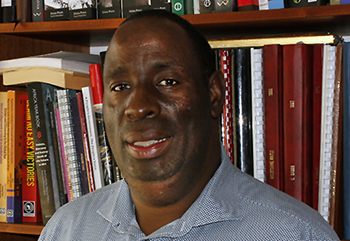Latest News Archive
Please select Category, Year, and then Month to display items
08 April 2021
|
Story Thabo Kessah
|
Photo UFS Photo Archive
 Dr KPD Maphalla with former UFS Chancellor, Dr Franklin Sonn, during the graduations in April 2007.
Dr KPD Maphalla with former UFS Chancellor, Dr Franklin Sonn, during the graduations in April 2007.
The University of the Free State is sad to learn of the passing of alumnus and award-winning Sesotho literary giant, Dr KPD Maphalla.
The literary works of Dr Khotso Pieter David Maphalla, like many other African writers and artists, were influenced and characterised by his own era of powerful forms of oppression and exclusion from dominant literary discourses. In his own right and through his writings of poetry, novels, short stories, and kodiamalla (dirge), he articulated a deliberate political and social protest and pushed for a place for African languages in literature at the height of apartheid.
“He entered the professional scene with his ground-breaking novel, Kabelwamanong, in 1982 at the age of 27. His career actually started in 1971 while he was still at school. Since his first novel, he has produced at least two books annually, covering the genres of poetry, novels, dramas, and short stories. As a dramatist, Dr Maphalla has written a number of excellent and educative radio dramas for the then Radio Sesotho (now Lesedi FM),” said his long-time friend and Head: African Languages at the University of the Free State, Dr Nyefolo Malete.
“It was for this writing prowess that he received recognition from the UFS when he was awarded an Honorary Doctorate in Literature by the Department of African Languages during a momentous ceremony on the Qwaqwa Campus in 2007,” added Dr Malete.
Dr Malete also revealed that, despite losing the use of his right hand after suffering a stroke following a car accident in the late 1990s, Dr Maphalla continued writing using his left hand. “He was adamant that, what he referred to as his ‘supposed disability’, would not deter his passion for writing.”
Dr Maphalla’s work has also produced numerous scholarly studies by the likes of Profs Moleleki Moleleki (protest poetry), Thapelo Selepe (lament and protest poetry), and Dr Seema Seema (process of cross-cultural communication). He was a committed Qwaqwa community member, who was also instrumental in the founding of Qwaqwa Community Radio (2000) and Metjodi Writers (2006), among others. He has written more than 70 books, many of which have been prescribed texts in schools.
Some of the awards he has won include:
South African Centre for Digital Language Resource (SADiLar) Sesotho Lexicographic Unit (Sesiu sa Sesotho) Lifetime Award for outstanding literary works and for promoting Sesotho literature (2019).
The Literature Festival and the University of the Free State Award for enormous contribution to Sesotho literature by a South African writer (2019).
Lifetime Achiever Award in Literature awarded by the Department of Arts and Culture (2005).
M-Net Book Prize for Sesotho poetry (2005). The first and thus far the only Sesotho author to have received this honour.
M-Net Book Prize for best novel (1996).
De Jager-HAUM Literary Award for his volume of short stories, Mohlomong Hosane (1993).
Thomas Mofolo Trophy for Best Novel, Best Poetry, and the Overall Award (1992).
Thomas Mofolo Trophy for Best Poetry (1991).
Dr JJ Moiloa Floating Trophy for Best Sesotho Poetry Book of the Year, Kgapa tsa ka (1985).
UFS History lecturer becomes Visiting Fellow at Harvard
2015-05-25

Dr Chitja Twala
Photo: Eugene Seegers |
Prestige Scholar and lecturer of African/South African History at the UFS, Dr Chitja Twala, was recently accepted as a Visiting Fellow at the Harvard Graduate School of Arts and Sciences (GSAS).
A Visiting Fellow status is available to individuals holding a doctoral degree to pursue independent research at Harvard. The Fellowship is for non-degree purposes but aims at the enhancement and further intellectual development of those involved. It focuses on enrichment and development programmes.
Twala was appointed in the Department of History at the UFS in the beginning of 2003. His research field is Liberation History, with specific reference to the liberation movements on the SADC region. He has published extensively on this field and presented papers in local and international conferences.
“I applied (to Harvard GSAS) in April 2014 for the Fellowship through the South Africa Harvard Fellowship Programme,” says Twala.
“After being successful in the interviews conducted by the GSAS panel in July 2014, I had to apply for admission in the Department of African and African American Studies at Harvard, and got accepted for the Fall Semester of 2015.”
At Harvard, Twala will be mentored by Prof Emmanuel Akyeampong (African History Expert).
“Firstly, my main assignment will be to grasp a much deeper theoretical knowledge/framework in historical studies and a broader repertoire of methodologies in the field of African History. Secondly, if time permits, I will be presenting seminars and attending some in a very challenging, stimulating, and intellectually demanding environment where my ideas can be tested and expanded. Thirdly, I will be exposed to new trends as far as African historiography is concerned. Lastly, I will informally engage and exchange some ideas with some experts in the field of African History.”
The programme was recommended to Twala by the Vice-Chancellor and Rector, Prof Jonathan Jansen and Prof Ian Phimister, Centre for Africa Studies Senior Professor at UFS.
“As per the priorities of the Prestige Scholarship Programme, the Fellowship will assist in inculcating in me the intellectual breadth and depth required to pose critical questions and generate ground-breaking knowledge for History as a discipline. It is important for the UFS to establish and sustain international networks with other leading universities and scholars around the world.
“I applied for this Fellowship in order to advance further and broaden the scope in the three areas of scholarship in higher education: discovery, teaching, and public engagement,” says Twala.
Twala will be leaving for Harvard by mid-August and will return by the end of December 2015.